Unit 4 Don’t eat in class-Section B (1a~2c)课件(共34张PPT)
文档属性
| 名称 | Unit 4 Don’t eat in class-Section B (1a~2c)课件(共34张PPT) | 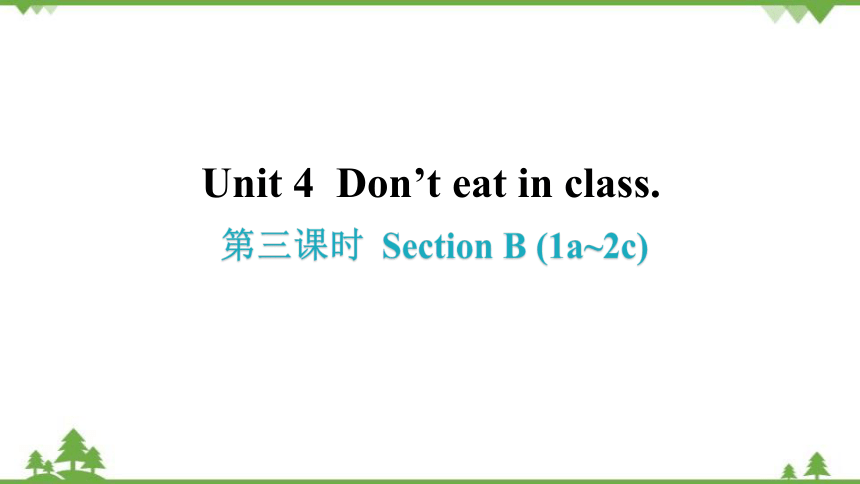 | |
| 格式 | pptx | ||
| 文件大小 | 322.3KB | ||
| 资源类型 | 教案 | ||
| 版本资源 | 人教新目标(Go for it)版 | ||
| 科目 | 英语 | ||
| 更新时间 | 2022-05-10 19:00:07 | ||
图片预览

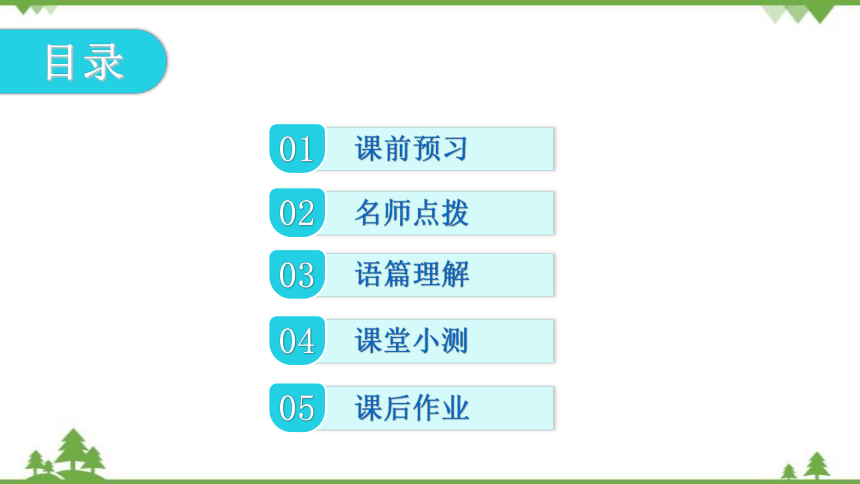
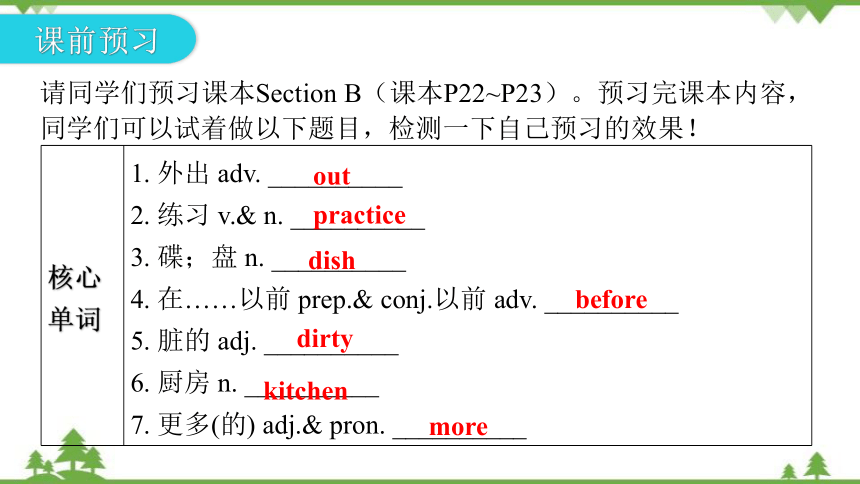
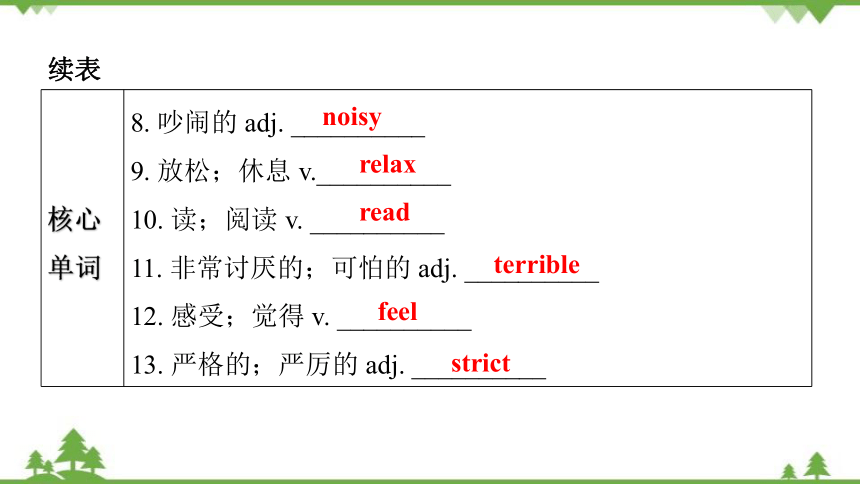
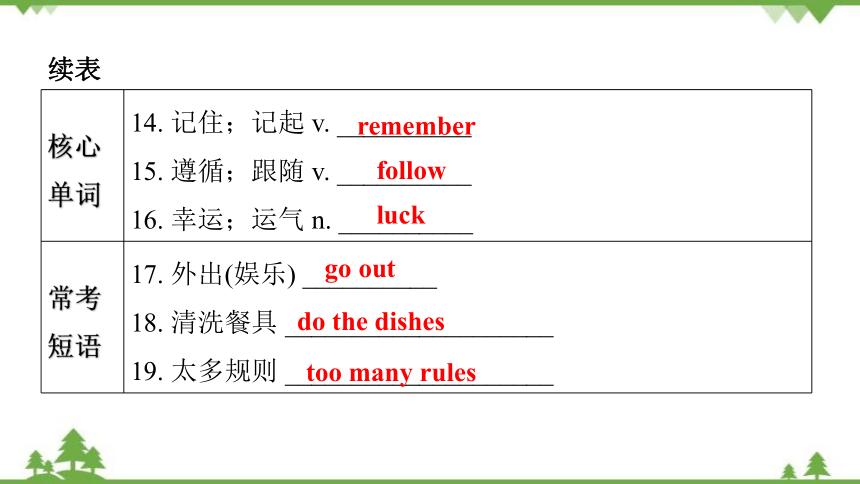
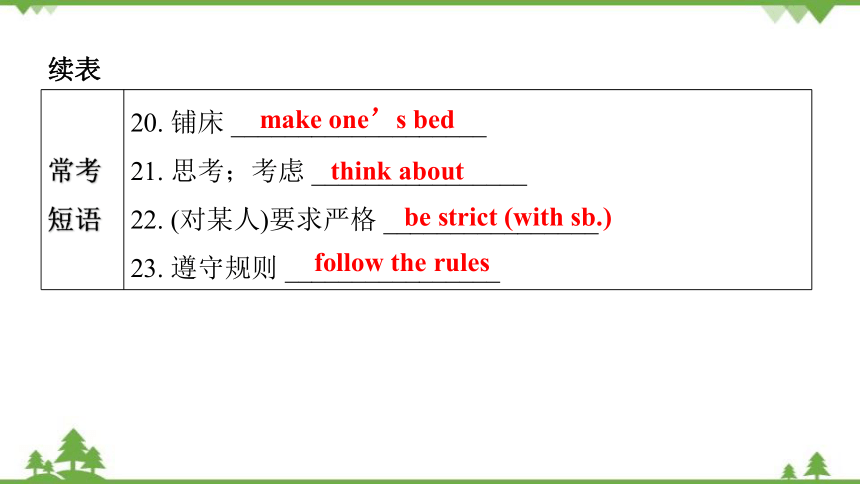
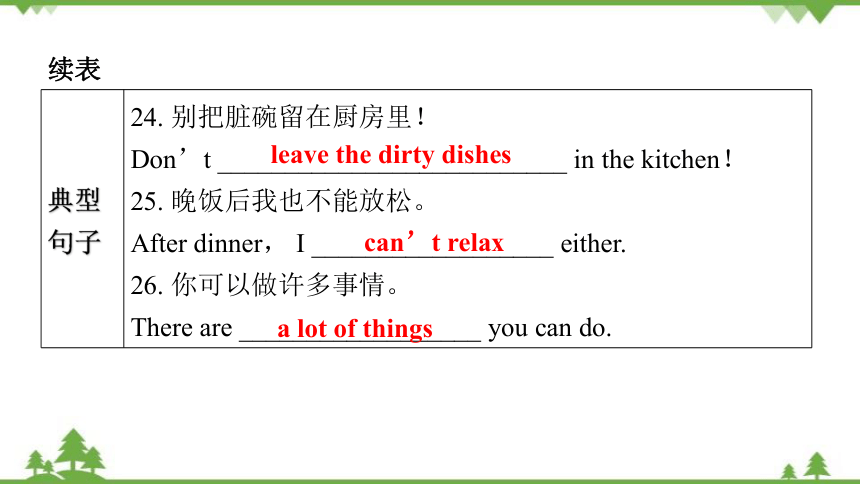
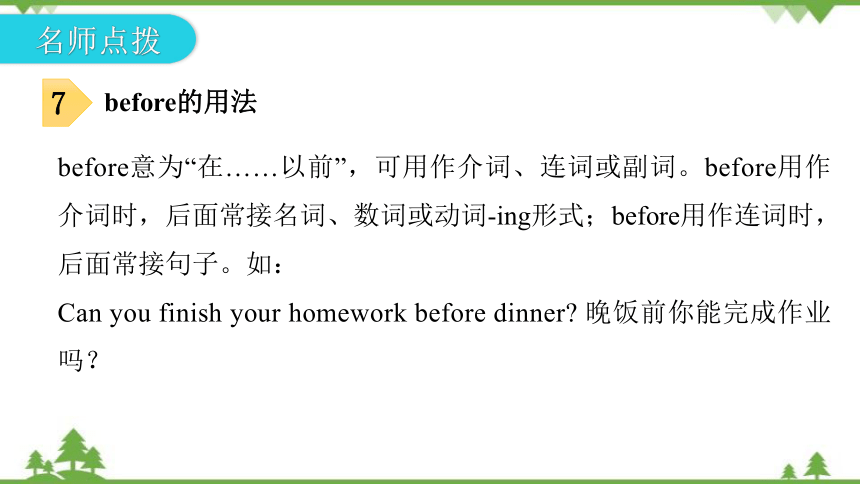
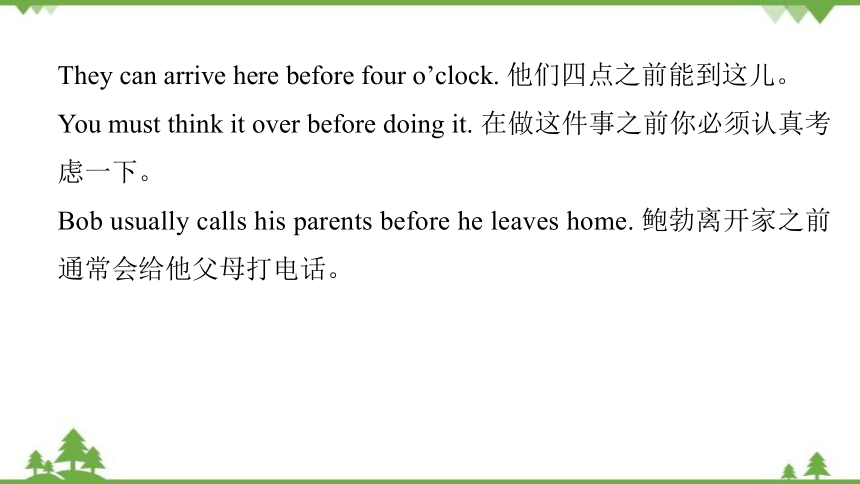
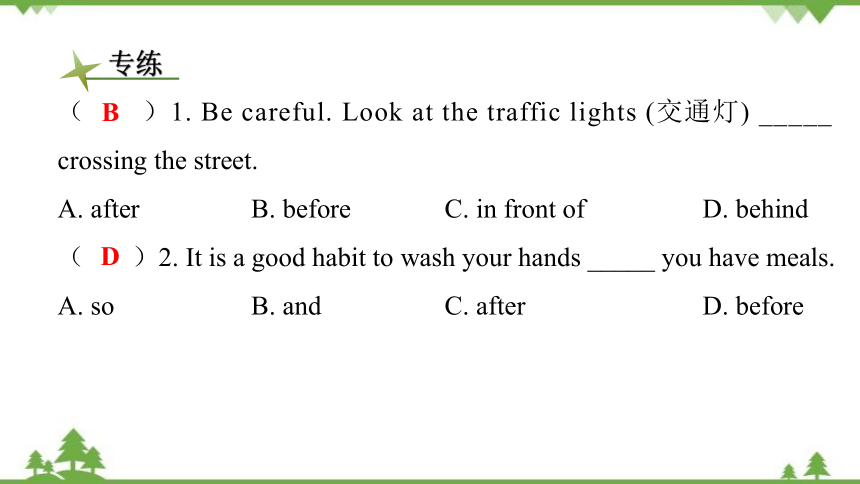
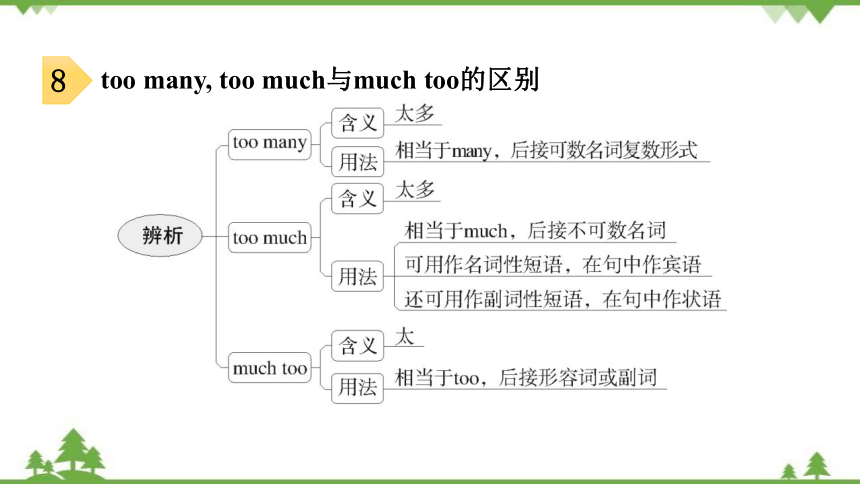
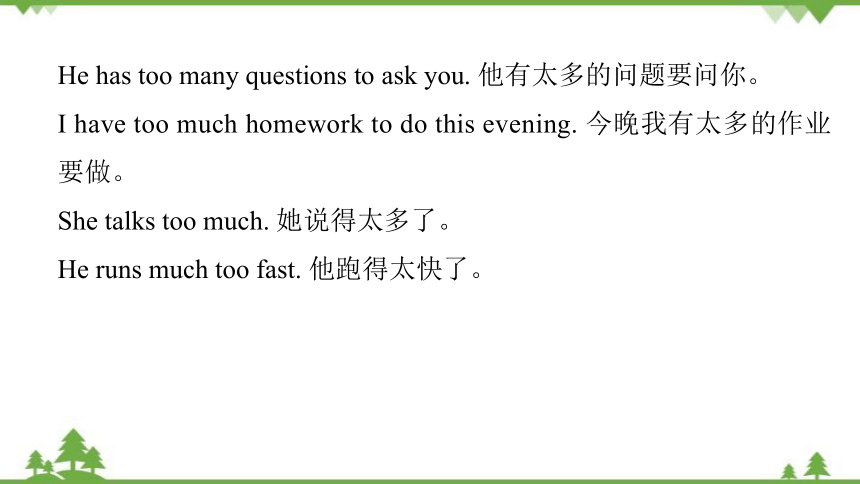
文档简介
(共34张PPT)
Unit 4 Don’t eat in class.
第三课时 Section B (1a~2c)
目录
01
课前预习
02
名师点拨
04
课堂小测
05
课后作业
03
语篇理解
课前预习
核心单词 1. 外出 adv. __________
2. 练习 v.& n. __________
3. 碟;盘 n. __________
4. 在……以前 prep.& conj.以前 adv. __________
5. 脏的 adj. __________
6. 厨房 n. __________
7. 更多(的) adj.& pron. __________
请同学们预习课本Section B(课本P22~P23)。预习完课本内容,同学们可以试着做以下题目,检测一下自己预习的效果!
out
practice
dish
before
dirty
kitchen
more
续表
核心单词 8. 吵闹的 adj. __________
9. 放松;休息 v.__________
10. 读;阅读 v. __________
11. 非常讨厌的;可怕的 adj. __________
12. 感受;觉得 v. __________
13. 严格的;严厉的 adj. __________
noisy
relax
read
terrible
feel
strict
续表
核心单词 14. 记住;记起 v. __________
15. 遵循;跟随 v. __________
16. 幸运;运气 n. __________
常考短语 17. 外出(娱乐) __________
18. 清洗餐具 ____________________
19. 太多规则 ____________________
remember
follow
luck
go out
do the dishes
too many rules
续表
常考短语 20. 铺床 ___________________
21. 思考;考虑 ________________
22. (对某人)要求严格 ________________
23. 遵守规则 ________________
make one’s bed
think about
be strict (with sb.)
follow the rules
续表
典型句子 24. 别把脏碗留在厨房里!
Don’t __________________________ in the kitchen!
25. 晚饭后我也不能放松。
After dinner, I __________________ either.
26. 你可以做许多事情。
There are __________________ you can do.
leave the dirty dishes
can’t relax
a lot of things
名师点拨
7
before的用法
before意为“在……以前”,可用作介词、连词或副词。before用作介词时,后面常接名词、数词或动词-ing形式;before用作连词时,后面常接句子。如:
Can you finish your homework before dinner 晚饭前你能完成作业吗?
They can arrive here before four o’clock. 他们四点之前能到这儿。
You must think it over before doing it. 在做这件事之前你必须认真考虑一下。
Bob usually calls his parents before he leaves home. 鲍勃离开家之前通常会给他父母打电话。
专练
( )1. Be careful. Look at the traffic lights (交通灯) _____ crossing the street.
A. after B. before C. in front of D. behind
( )2. It is a good habit to wash your hands _____ you have meals.
A. so B. and C. after D. before
B
D
8
too many, too much与much too的区别
He has too many questions to ask you. 他有太多的问题要问你。
I have too much homework to do this evening. 今晚我有太多的作业要做。
She talks too much. 她说得太多了。
He runs much too fast. 他跑得太快了。
专练
( )1. Mr.Brown is too busy. He has __________ work to do every day.
A. too many B. too much C. much too D. many too
( )2. The box is very heavy because there are __________ books in it.
A. a lot B. much too C. too much D. too many
3. 他太累了。他想休息。(根据汉语意思完成句子,词数不限)
He is __________ tired. He wants to relax.
B
D
much too
9
“leave sth.+地点”结构的用法
“leave sth.+地点”意为“把某物留在某地”,其中的“地点”多用介词短语表示。如:
He often leaves his dictionary at home. 他经常把他的词典落在家里。
专练 根据汉语意思完成句子,词数不限
1. 他太粗心了。他常把钥匙落在图书馆里。
He is too careless. He often __________ his keys __________ the library.
2. 不要把你的书包留在教室。
Don’t ______________________________ in the classroom.
leaves
in
leave your schoolbag / bag
10
strict 的用法
strict是形容词,意为“严格的;严厉的”,可置于名词之前作定语,也可置于be动词之后作表语。如:
He is a strict teacher, but we like him very much. 他是一位严厉的老师,但是我们非常喜欢他。
The rules of the middle school are very strict. 这所中学的规章制度非常严格。
【拓展】 strict的常见搭配
Tom’s parents are strict with him. 汤姆的父母对他要求严格。
My father is very strict in / about his work. 我父亲对他的工作要求非常严格。
专练 根据汉语意思完成句子,词数不限
1. 不要对孩子们要求太严格。
Don’t __________ too ________________ the children.
2. 海伦对她的学习要求严格。
Helen ________________ her study.
be
strict with
is strict in/about
11
remember 的用法
remember作动词,意为“记住;记起”,后面常接名词、代词作宾语。
【拓展】 remember的常见搭配
Remember to practice the piano every day. 记得每天练习弹钢琴。
I remember telling you about it. 我记得把这件事告诉过你了。
Remember that you must come back before 9:00 p.m. 记住你必须在晚上9点前回来。
专练
( )1. Do you know her I remember _____ you something about her.
A. telling B. to tell C. tell D. tells
( )2. —Please call me this afternoon.
—Sorry, I can’t _____ your telephone number.
A. read B. practice C. remember D. follow
A
C
语篇理解
一、阅读教材P23-2b的课文,选出下列各题的最佳选项
( )1. Molly thinks her family rules are _____.
A. good B. relaxingC. terribleD. boring
( )2. Which rule does Molly have to follow
A. Get up at 6:30 a. m.and make the bed.
B. Eat in the classroom.
C. Wash the dirty dishes after dinner.
D. Read a book before watching TV.
C
D
( )3. We can see the letters from a(n)_____.
A. storybook B. notebook
C. advertisement D. newspaper
D
二、再仔细阅读课文,回答下列问题
1. When does Molly get up
________________________________________________________
2. Where is Molly from
________________________________________________________
3. Why do parents and schools make rules
________________________________________________________
Molly / She gets up at 6:00 a.m. / At 6:00 a.m.
She is from New York. / New York. / America. / The US.
Because parents and schools / they make rules to help us.
三、 本单元主要短语串联使用(用方框内所给短语的适当形式
填空)
too many, be strict with, make the bed, think about, do the dishes, go out, on time, practice doing sth., listen to
Every family has rules, so does mine(我家也有).
Rule No. 1, 1. _______________ after getting up. “One who leaves his bed in a mess will achieve nothing (起了床不叠被子的人将是一事无成的人),”my mom always says.
make the bed
My mom is a very good cook and she usually takes care of(搞定) everything in the kitchen. But on weekends, I have to 2. __________ after breakfast. On the morning of the weekend, I must 3. __________ the piano for half an hour. And if I can finish my homework on Saturday morning, I can 4. __________ on Saturday afternoon and Sunday. But I must come back home before 5:30 p. m. If I’m not
5. __________, I have to clean the living room for a week.
do the dishes
practice playing
go out
on time
There is a very interesting family rule in my family. We have a family party at home every weekend, and everyone should perform(表演). Mostly(大体上) the party is fun, but my father’s singing is really a disaster(灾难). What’s worse(更糟糕的是), if we don’t
6. ________ him carefully, things will get really ugly(情况会很难堪).
Sometimes I think my family has 7.__________ rules, and my parents 8. __________ me too much. What do you 9. __________ these
listen to
too many
are strict with
think about
课堂小测
一、根据句意及中文或首字母提示,用单词的适当形式填空
1. —Jim, wash your sweater after dinner.
—Why?I don’t think my sweater is __________(脏的).
2. I was busy last week. I want __________(休息) today.
3. The salad is __________(糟糕). I don’t want to eat it.
4. So many people are talking here. It’s very n_________.
5. David, please r_________ to turn off the light before you leave.
dirty
to relax
terrible
oisy
emember
二、根据要求完成句子,每空一词
6. You can’t speak Chinese in English class. (改为祈使句)
__________ __________ Chinese in English class.
7. We can watch TV before dinner. (就画线部分提问)
__________ __________ you watch TV
8. He has to run to school every day. (改为一般疑问句)
__________ __________ __________ to run to school every day
Don’t
speak
When
can
Does
he
have
9. Can you ride a bike to school (作否定回答)
__________, __________ __________.
10. I have to do my homework every day. (就画线部分提问)
__________ __________ you have to __________ every day
No
I
can’t
What
do
do
三、单项填空
( )11. —I have an English test this afternoon.
—Good __________ to you.
A. morning B. dream C. number D. luck
( )12. Mr.Miller is strict __________ his students and strict __________ his work.
A. with; in B. with; with C. in; with D. in; in
D
A
( )13. Jenny, you look very tired. Let’s go out and __________.
A. work B. live C. relax D. study
( )14. —What __________ rules!
—Yes!You don’t like them and I don’t like them, either.
A. interesting B. terrible C. important D. new
( )15. I remember __________ your ticket home,but I can’t find it.
A. to bring B. bring C. brings D. bringing
C
B
D
此部分习题详见独立装订的《课后作业》。请同学们完成《课后作业》Unit 4第三课时的练习题。
课后作业
谢 谢!
Unit 4 Don’t eat in class.
第三课时 Section B (1a~2c)
目录
01
课前预习
02
名师点拨
04
课堂小测
05
课后作业
03
语篇理解
课前预习
核心单词 1. 外出 adv. __________
2. 练习 v.& n. __________
3. 碟;盘 n. __________
4. 在……以前 prep.& conj.以前 adv. __________
5. 脏的 adj. __________
6. 厨房 n. __________
7. 更多(的) adj.& pron. __________
请同学们预习课本Section B(课本P22~P23)。预习完课本内容,同学们可以试着做以下题目,检测一下自己预习的效果!
out
practice
dish
before
dirty
kitchen
more
续表
核心单词 8. 吵闹的 adj. __________
9. 放松;休息 v.__________
10. 读;阅读 v. __________
11. 非常讨厌的;可怕的 adj. __________
12. 感受;觉得 v. __________
13. 严格的;严厉的 adj. __________
noisy
relax
read
terrible
feel
strict
续表
核心单词 14. 记住;记起 v. __________
15. 遵循;跟随 v. __________
16. 幸运;运气 n. __________
常考短语 17. 外出(娱乐) __________
18. 清洗餐具 ____________________
19. 太多规则 ____________________
remember
follow
luck
go out
do the dishes
too many rules
续表
常考短语 20. 铺床 ___________________
21. 思考;考虑 ________________
22. (对某人)要求严格 ________________
23. 遵守规则 ________________
make one’s bed
think about
be strict (with sb.)
follow the rules
续表
典型句子 24. 别把脏碗留在厨房里!
Don’t __________________________ in the kitchen!
25. 晚饭后我也不能放松。
After dinner, I __________________ either.
26. 你可以做许多事情。
There are __________________ you can do.
leave the dirty dishes
can’t relax
a lot of things
名师点拨
7
before的用法
before意为“在……以前”,可用作介词、连词或副词。before用作介词时,后面常接名词、数词或动词-ing形式;before用作连词时,后面常接句子。如:
Can you finish your homework before dinner 晚饭前你能完成作业吗?
They can arrive here before four o’clock. 他们四点之前能到这儿。
You must think it over before doing it. 在做这件事之前你必须认真考虑一下。
Bob usually calls his parents before he leaves home. 鲍勃离开家之前通常会给他父母打电话。
专练
( )1. Be careful. Look at the traffic lights (交通灯) _____ crossing the street.
A. after B. before C. in front of D. behind
( )2. It is a good habit to wash your hands _____ you have meals.
A. so B. and C. after D. before
B
D
8
too many, too much与much too的区别
He has too many questions to ask you. 他有太多的问题要问你。
I have too much homework to do this evening. 今晚我有太多的作业要做。
She talks too much. 她说得太多了。
He runs much too fast. 他跑得太快了。
专练
( )1. Mr.Brown is too busy. He has __________ work to do every day.
A. too many B. too much C. much too D. many too
( )2. The box is very heavy because there are __________ books in it.
A. a lot B. much too C. too much D. too many
3. 他太累了。他想休息。(根据汉语意思完成句子,词数不限)
He is __________ tired. He wants to relax.
B
D
much too
9
“leave sth.+地点”结构的用法
“leave sth.+地点”意为“把某物留在某地”,其中的“地点”多用介词短语表示。如:
He often leaves his dictionary at home. 他经常把他的词典落在家里。
专练 根据汉语意思完成句子,词数不限
1. 他太粗心了。他常把钥匙落在图书馆里。
He is too careless. He often __________ his keys __________ the library.
2. 不要把你的书包留在教室。
Don’t ______________________________ in the classroom.
leaves
in
leave your schoolbag / bag
10
strict 的用法
strict是形容词,意为“严格的;严厉的”,可置于名词之前作定语,也可置于be动词之后作表语。如:
He is a strict teacher, but we like him very much. 他是一位严厉的老师,但是我们非常喜欢他。
The rules of the middle school are very strict. 这所中学的规章制度非常严格。
【拓展】 strict的常见搭配
Tom’s parents are strict with him. 汤姆的父母对他要求严格。
My father is very strict in / about his work. 我父亲对他的工作要求非常严格。
专练 根据汉语意思完成句子,词数不限
1. 不要对孩子们要求太严格。
Don’t __________ too ________________ the children.
2. 海伦对她的学习要求严格。
Helen ________________ her study.
be
strict with
is strict in/about
11
remember 的用法
remember作动词,意为“记住;记起”,后面常接名词、代词作宾语。
【拓展】 remember的常见搭配
Remember to practice the piano every day. 记得每天练习弹钢琴。
I remember telling you about it. 我记得把这件事告诉过你了。
Remember that you must come back before 9:00 p.m. 记住你必须在晚上9点前回来。
专练
( )1. Do you know her I remember _____ you something about her.
A. telling B. to tell C. tell D. tells
( )2. —Please call me this afternoon.
—Sorry, I can’t _____ your telephone number.
A. read B. practice C. remember D. follow
A
C
语篇理解
一、阅读教材P23-2b的课文,选出下列各题的最佳选项
( )1. Molly thinks her family rules are _____.
A. good B. relaxingC. terribleD. boring
( )2. Which rule does Molly have to follow
A. Get up at 6:30 a. m.and make the bed.
B. Eat in the classroom.
C. Wash the dirty dishes after dinner.
D. Read a book before watching TV.
C
D
( )3. We can see the letters from a(n)_____.
A. storybook B. notebook
C. advertisement D. newspaper
D
二、再仔细阅读课文,回答下列问题
1. When does Molly get up
________________________________________________________
2. Where is Molly from
________________________________________________________
3. Why do parents and schools make rules
________________________________________________________
Molly / She gets up at 6:00 a.m. / At 6:00 a.m.
She is from New York. / New York. / America. / The US.
Because parents and schools / they make rules to help us.
三、 本单元主要短语串联使用(用方框内所给短语的适当形式
填空)
too many, be strict with, make the bed, think about, do the dishes, go out, on time, practice doing sth., listen to
Every family has rules, so does mine(我家也有).
Rule No. 1, 1. _______________ after getting up. “One who leaves his bed in a mess will achieve nothing (起了床不叠被子的人将是一事无成的人),”my mom always says.
make the bed
My mom is a very good cook and she usually takes care of(搞定) everything in the kitchen. But on weekends, I have to 2. __________ after breakfast. On the morning of the weekend, I must 3. __________ the piano for half an hour. And if I can finish my homework on Saturday morning, I can 4. __________ on Saturday afternoon and Sunday. But I must come back home before 5:30 p. m. If I’m not
5. __________, I have to clean the living room for a week.
do the dishes
practice playing
go out
on time
There is a very interesting family rule in my family. We have a family party at home every weekend, and everyone should perform(表演). Mostly(大体上) the party is fun, but my father’s singing is really a disaster(灾难). What’s worse(更糟糕的是), if we don’t
6. ________ him carefully, things will get really ugly(情况会很难堪).
Sometimes I think my family has 7.__________ rules, and my parents 8. __________ me too much. What do you 9. __________ these
listen to
too many
are strict with
think about
课堂小测
一、根据句意及中文或首字母提示,用单词的适当形式填空
1. —Jim, wash your sweater after dinner.
—Why?I don’t think my sweater is __________(脏的).
2. I was busy last week. I want __________(休息) today.
3. The salad is __________(糟糕). I don’t want to eat it.
4. So many people are talking here. It’s very n_________.
5. David, please r_________ to turn off the light before you leave.
dirty
to relax
terrible
oisy
emember
二、根据要求完成句子,每空一词
6. You can’t speak Chinese in English class. (改为祈使句)
__________ __________ Chinese in English class.
7. We can watch TV before dinner. (就画线部分提问)
__________ __________ you watch TV
8. He has to run to school every day. (改为一般疑问句)
__________ __________ __________ to run to school every day
Don’t
speak
When
can
Does
he
have
9. Can you ride a bike to school (作否定回答)
__________, __________ __________.
10. I have to do my homework every day. (就画线部分提问)
__________ __________ you have to __________ every day
No
I
can’t
What
do
do
三、单项填空
( )11. —I have an English test this afternoon.
—Good __________ to you.
A. morning B. dream C. number D. luck
( )12. Mr.Miller is strict __________ his students and strict __________ his work.
A. with; in B. with; with C. in; with D. in; in
D
A
( )13. Jenny, you look very tired. Let’s go out and __________.
A. work B. live C. relax D. study
( )14. —What __________ rules!
—Yes!You don’t like them and I don’t like them, either.
A. interesting B. terrible C. important D. new
( )15. I remember __________ your ticket home,but I can’t find it.
A. to bring B. bring C. brings D. bringing
C
B
D
此部分习题详见独立装订的《课后作业》。请同学们完成《课后作业》Unit 4第三课时的练习题。
课后作业
谢 谢!
同课章节目录
- Unit 1 Can you play the guitar?
- Section A
- Section B
- Unit 2 What time do you go to school?
- Section A
- Section B
- Unit 3 How do you get to school?
- Section A
- Section B
- Unit 4 Don't eat in class.
- Section A
- Section B
- Unit 5 Why do you like pandas?
- Section A
- Section B
- Unit 6 I'm watching TV.
- Section A
- Section B
- Review of Units 1-6
- Unit 7 It's raining!
- Section A
- Section B
- Unit 8 Is there a post office near here?
- Section A
- Section B
- Unit 9 What does he look like?
- Section A
- Section B
- Unit 10 I'd like some noodles.
- Section A
- Section B
- Unit 11 How was your school trip?
- Section A
- Section B
- Unit 12 What did you do last weekend?
- Section A
- Section B
